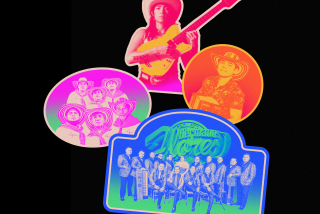POP MUSIC : Creole Master Makes ‘Them No-Good Fiddles’ Sound Great
- Share via
Canray Fontenot is considered one of the modern masters of the traditional French music of Louisiana, music that’s increasingly in demand at folk, blues, Cajun and zydeco festivals around the world.
But the instruments on which the seminal Creole fiddler got his start, back in the early 1930s, held little resemblance to the Stradivarius favored by Europe’s old masters. One of them, however, well may have been a Dutch Masters.
“We had this neighbor, Douglas Belard, who used to work during the day and play his fiddle at night,” Fontenot, 68, recalled on a recent muggy afternoon at his home in Welsh, La., about 30 miles east of Lake Charles. (Fontenot will play Saturday and Sunday at the fifth annual Southern California Cajun & Zydeco Festival in Long Beach, accompanied by accordionist Edward Poullard and his guitarist brother, Danny Poullard.)
Belard “would work when he could get some work, and then go and play his fiddle. So we used to go, me and his little cousin would go and take his fiddle and play the thing when he was off at work.”
This surreptitious system worked fine--until Belard cut a record that was a local hit.
“He got popular and then he was gone all the time,” Fontenot said with a sandpaper laugh, “and the fiddle was gone most of the time with him.”
The youngsters decided that if they could no longer borrow a fiddle, they’d make one. They got a couple of cigar boxes (“they were made out of wood then”), liberated an older brother’s butcher knife to carve a hole and attached a piece of wood for the neck (after using a piece of twine one night to measure the neck of Belard’s fiddle).
“Now, where we gonna get some strings?” Fontenot continued, recounting the incident as if it happened last month, not more than half a century ago. “You could get a set of strings for about 20 cents in those days, but we didn’t even have that . . . Well, his mama had a new screen door and we got some strings out of that, and we got a little switch, and got some sewing thread and we made our bow.
“We had some pine gum from the pine tree for our rosin. And, boy, that was a big thing for us. It didn’t sound loud. But you could hear it!”
Fontenot became one of the most respected and influential musicians from the fertile countryside in southwest Louisiana. But, he said, “as far as having a real good fiddle, I never did have that.”
Still, “David Doucet (guitarist with the Cajun band Beausoleil) told me, ‘You would be a damn fool to go spend a bunch of money on a fiddle. He say, ‘You take them little no-good fiddles and make them sound (beautiful).’ Well, I’m used to that, that’s why.”
Those inclined to check out this weekend’s festival are advised against asking Fontenot, one of the few living proponents of traditional black Creole music, to play any zydeco. Even though zydeco commonly is defined as the black Creole counterpart to the French waltzes and two-steps of the white Cajuns, such a request would more likely produce a tirade than a performance.
“I like playing with them Poullard brothers because they don’t believe in that zydeco stuff,” Fontenot said. “They asked me a while back what I thought about that, and I said if I could line all them zydeco fellas up and give me a machine gun, I say there’s gonna be no more of that zydeco stuff. They can’t write nothin’ and they can’t sing nothin.’ ”
Fontenot--who in 1986 received a National Endowment for the Arts’ National Heritage Foundation award as a “Master Traditional Artist”--prefers the old songs passed along orally through the generations, minor-key ballads that tell of the loneliness of being away from home, aching waltzes about losing a love, or sprightly two-steps that relate the joy of finding one.
He tends to avoid the froittoir (the vest-like corrugated metal rub board used as rhythmic accompaniment in zydeco) as well as electric bass and drums. Any extra rhythm Fontenot requires, he normally supplies for himself with God’s drumsticks--his feet.
And though he can turn to the Bob Wills or Hank Williams songbooks if the mood strikes, Fontenot rarely sings in English, as many Cajun and zydeco performers have begun to do in efforts to broaden their appeal (“At my age,” he says, “I’m gonna play the way I want or I ain’t gonna play at all”).
Fontenot’s use of French never seems to bother his audiences, whether he’s helping bring the annual New Orleans Jazz & Heritage Festival to a heady climax, or performing at Carnegie Hall, or playing to cheering crowds in Europe.
“French music makes people move,” Fontenot said with an irresistible smile. “They might not understand what the words say, but they know what it makes them feel.”
What: The fifth annual Southern California Cajun & Zydeco Festival featuring Canray Fontenot & the Poullard Brothers, Michael Doucet & Beausoleil, C.J. Chenier & the Red Hot Louisiana Band, Wayne Toups & ZydeCajun, Wilfred Latour & the Zydeco Goodtime Aces, Joe Simien & the Country Boys, the Zydeco Party Band and the Sundogs.
When: Saturday and Sunday, June 1 and 2, from noon to 7 p.m.
Where: Rainbow Lagoon, Long Beach.
Whereabouts: Take the 7th Street/Long Beach exit off the San Diego Freeway, continue west to Long Beach Boulevard, turn left and head south to Ocean Boulevard. Rainbow Lagoon is just behind the Long Beach Convention Center.
Wherewithal: $12 to $15; kids under 12 free.
Where to Call: (714) 638-1466 or (213) 404-1608.
More to Read
The biggest entertainment stories
Get our big stories about Hollywood, film, television, music, arts, culture and more right in your inbox as soon as they publish.
You may occasionally receive promotional content from the Los Angeles Times.










